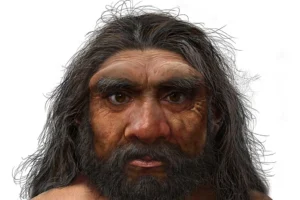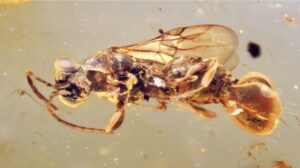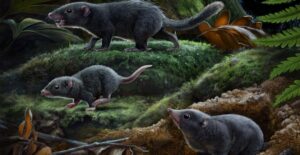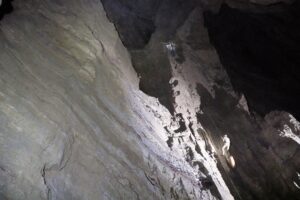Archaeologists in India have found the oldest diplodocid in the world. These plant-eating dinosaurs feature long bodies and necks. The researchers discovered the fossil in the Thar Desert of Rajasthan, in western India.
These are the first remains of this type of dinosaur discovered in India. The fossil, a partial dorsal vertebrae, dates back 167 million years.

Part of the dorsal vertebra of Tharosaurus indicus. Photo: Pragya Pandey
Tharosaurus indicus
The research team has named the new species Tharosaurus indicus. Dicraeosaurids had distinctive spikes running across their neck and spine, but Tharosaurus indicus has some features that set it apart from other species in the family. It had depressions on the sides of the neck bone, neural spines that jutted out in pairs in unusual directions, and a frontal vertebrae surface near the tailbone that was heart-shaped.
Dicraeosaurids have been found across Africa, China, and the Americas. The fossils date to the Middle Jurassic and Early Cretaceous periods and, previously, archaeologists had discovered the oldest dicraeosaurid in China, dating it at 164 million years old.

Palaeogeographic distribution of diplodocoids. Numbers indicate the age of the fossils: 1 — Middle Jurassic (early–middle Bathonian); 2 — Late Jurassic; 3 — Cretaceous; 4 — Middle Jurassic (Callovian). Image: Bajpai et al., 2023
The authors of the new study stress that this discovery highlights the need to study fossils across India to better understand Earth’s prehistory.
They believe that this discovery proves India was central to the emergence of neosauropods (a subgroup of sauropods). Sauropods came into the evolutionary picture during the Late Triassic and Early Jurassic periods. The origin of the subgroup has been a mystery and this fossil could be the missing piece of the puzzle.
At the time, the region where archeologists discovered the fossil would have been on the coast. It is possible that neosuaropods evolved in India and then dispersed across supercontinents.
The research “suggests that the new Indian taxon is a relic of a lineage that originated in India and underwent rapid dispersal across the rest of Pangaea…we emphasize the importance of Gondwanan India in tracing the origin and early evolutionary history of neosauropod dinosaurs,” the authors of the study wrote.

Caudal vertebrae of Tharosaurus indicus. Image: Bajpai et al., 2023






